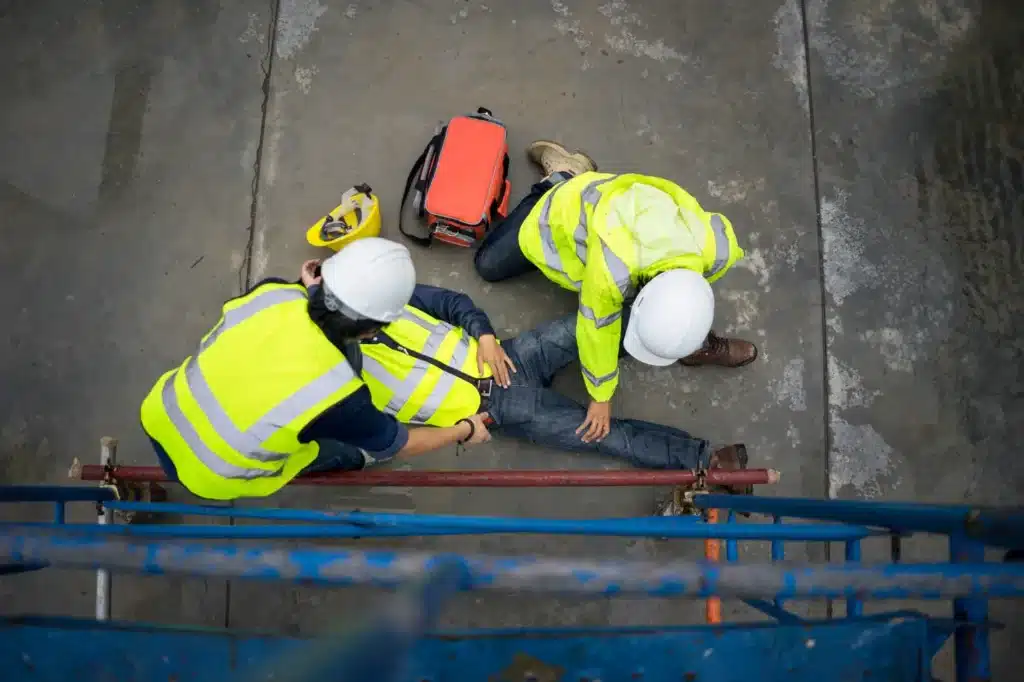
At Cesar Ornelas Injury Law, we know how challenging these situations can be. We offer free consultations to help you understand your legal options and decide the best path forward. Our team is here to support you and provide the legal guidance you need to seek fair compensation. Don’t go through this difficult time alone—contact us at 210-957-2103 for a free, no-obligation consultation. Let us help you get the justice and financial recovery you deserve.
Understanding Catastrophic Work Injuries
A catastrophic work injury is a severe, life-changing injury that can lead to permanent disabilities. These injuries often affect the central nervous system, resulting in long-term challenges. Catastrophic work injuries encompass a wide range of serious conditions, including but not limited to:
- Traumatic Brain Injuries (TBIs): These injuries can result from falls, being struck by objects, or other accidents, leading to cognitive, physical, and emotional impairments.
- Spinal Cord Injuries: Such injuries can cause partial or complete paralysis, significantly altering a person’s mobility and quality of life.
- Amputations: Losing a limb can result from machinery accidents or severe crush injuries, impacting an individual’s ability to perform daily tasks.
- Severe Burns: These can occur due to chemical exposure, electrical accidents, or fires, often requiring extensive medical treatment and rehabilitation.
- Internal Organ Damage: Accidents causing significant impact or penetration can lead to life-threatening damage to organs.
- Multiple Fractures: Severe bone fractures can result from falls or being caught in machinery, requiring long-term recovery and rehabilitation.
- Loss of Vision or Hearing: Exposure to hazardous environments can lead to permanent sensory loss, affecting an individual’s ability to work and interact with their surroundings.
Understanding how often catastrophic injuries occur and their impact is critical. At Cesar Ornelas Injury Law, we are dedicated to helping injured employees understand their rights and the compensation they deserve. Our experienced team guides you through the complexities of workers’ compensation claims and personal injury lawsuits, ensuring you receive the maximum compensation possible for your injuries.
Steps to Take After a Catastrophic Work Injury
Experiencing a catastrophic work injury can be overwhelming, but taking the right steps immediately can significantly impact your recovery and ability to secure fair compensation.
- Seek Immediate Medical Attention: Prioritize your health by getting medical care as soon as possible, even if the injury seems minor at first. This ensures prompt treatment and accurate documentation of your injuries.
- Document the Incident: Capture detailed records of the accident scene. Take photos, gather contact information from witnesses, and secure any available accident reports. This documentation is important for both legal and medical purposes.
- Notify Your Employer: Inform your supervisor or employer about the injury without delay. This notification initiates the workers’ compensation process and helps protect your rights.
- File a Workers’ Compensation Claim: Complete and submit the necessary forms to file a workers’ compensation claim. This step is vital for receiving benefits like medical expenses and lost wages.
- Keep Detailed Records: Maintain a comprehensive file of all medical treatments, expenses, communications with your employer and insurance company, and any other relevant documents. These records will support your claim and any potential legal action.
- Consult a Skilled Lawyer: Seek a workers’ compensation lawyer to clarify your rights and explore all possible compensation avenues. A lawyer can guide you through the complicated legal landscape and ensure you receive maximum benefits.
- Consider Third-Party Liability: If a third party contributed to your injury, discuss the possibility of filing a third-party claim with your lawyer. This can provide additional compensation beyond workers’ compensation benefits.
- Follow Medical Advice: Adhere to all medical recommendations and attend follow-up appointments. This not only aids your recovery but also strengthens your case by showing compliance with treatment plans.
- Review Your Legal Options Regularly: Stay informed about your legal options and review them with your lawyer as your case progresses. This ensures you are prepared for any changes or additional steps that may be necessary.
By following these steps, you can protect your rights and improve your chances of securing the compensation you deserve after a catastrophic work injury. At Cesar Ornelas Injury Law, we are committed to guiding you through every step of this process, ensuring you receive the support and representation needed to achieve the best possible outcome.
Workers’ Compensation for Catastrophic Injuries

For severe injuries, the workers’ compensation system provides more extensive benefits. If your injury is so serious that you can’t work anymore, you might be eligible for lifetime benefits. These benefits include disability payments, which depend on the severity and type of your disability. This financial support is crucial for maintaining stability while you recover.
Workers’ compensation also often covers lost wages. You can receive about two-thirds of your lost income, tax-free, helping you manage daily expenses and maintain your quality of life. This is especially beneficial for those with workers’ compensation insurance.
Additionally, workers’ compensation covers a wide range of medical expenses, such as doctor visits, treatments, hospital stays, and related costs. This comprehensive medical care ensures all aspects of your health are addressed, aiding in a more effective recovery.
Exceptions Allowing You to Sue Your Employer
While workers’ compensation laws usually prevent you from suing your employer for workplace injuries, there are specific situations where you can take legal action. Knowing these exceptions is critical for getting justice and fair compensation. Here are the main scenarios where you might be able to sue your employer:
- Intentional Harm by Employer: If your employer deliberately harms you, you can file a lawsuit to get more compensation than what workers’ compensation offers. This holds employers accountable for intentional harm.
- No Workers’ Compensation Insurance: If your employer doesn’t have workers’ compensation insurance, you can file a personal injury lawsuit for compensation. This emphasizes the importance of employers having workers’ compensation insurance to protect both themselves and their employees.
- Employer’s Willful Assault: If an employer’s intentional assault causes your injury, you can seek compensation through a civil lawsuit, bypassing the workers’ compensation system.
- Employer’s Removal of Safety Equipment: If your employer knowingly removes safety equipment, leading to your injury, you can sue outside the workers’ compensation system.
Understanding these exceptions is vital to knowing your legal rights after a workplace injury. Consulting with a skilled workplace injury lawyer can help you navigate these complexities and choose the best course of action for your situation.
What Are Some Examples of Employer Misconduct That Allow for Lawsuits?
Employer misconduct can sometimes lead to a lawsuit outside the workers’ compensation system. Here are some examples where an injured employee might be able to take legal action:
- Intentional Harm: If your employer purposely harms you, you can file a personal injury lawsuit since this goes beyond simple negligence.
- Unsafe Work Environment: Employers must keep the workplace safe. If they ignore safety rules and you get hurt, they could be liable.
- Retaliation: If your employer punishes you for filing a workers’ compensation claim, like firing or demoting you, you might have a case for a lawsuit.
- Misleading Information: If your employer lies about job safety or workers’ compensation coverage, they could face legal action.
- Breaking Employment Laws: Violating laws about discrimination or harassment at work can result in a lawsuit from the affected employee.
Knowing these types of misconduct can help employees understand when they might have a valid reason to sue their employer. Consulting with a skilled lawyer can provide further guidance and support in pursuing such claims.
Third-Party Claims for Catastrophic Injuries

To pursue a third-party claim successfully, you must provide evidence of negligence from the other party. This could involve proving that a contractor, equipment manufacturer, or another entity failed to uphold safety standards, leading to your injury. Third-party claims often offer higher potential recovery, as compensation is typically not capped like workers’ compensation benefits.
If you receive compensation from a third party after obtaining workers’ compensation benefits, you may need to reimburse some of that compensation to the workers’ compensation program. This prevents double recovery for the same injury. Consulting a skilled personal injury lawyer is critical in these cases, as they can navigate the complexities of third-party claims and help maximize your compensation.
Determining Liable Parties
Determining who is responsible for a workplace injury is key to getting compensation. In catastrophic injury cases, multiple parties could be at fault:
- Employers: If your employer’s negligence or failure to ensure a safe workplace caused your injury, they could be held responsible, especially if they don’t have workers’ compensation insurance.
- Third Parties: Other people or companies, like contractors or subcontractors, who were involved at the job site might share responsibility if their actions led to the accident.
- Product Manufacturers: If a faulty product or machine caused your injury, the manufacturer might be liable, allowing you to file a personal injury lawsuit against them.
- Property Owners: If unsafe conditions on a property led to your injury, the property owner might be responsible.
Identifying all responsible parties is essential to maximize your compensation. Consulting with experienced lawyers, like those at Cesar Ornelas Injury Law, can help you navigate these challenging situations. Our team is committed to thoroughly investigating your case to find all liable parties and pursue every possible avenue for compensation.
What Happens If Multiple Parties Share Liability?
When multiple parties are responsible for a workplace injury, it’s important to determine how much each party is at fault to ensure fair compensation. This can be complicated, as each party’s responsibility must be evaluated.
Liability can be shared among employers, third-party contractors, equipment manufacturers, and property owners. Each party is accountable for their part in causing the injury. For example, an employer might be at fault for not providing a safe work environment, while a manufacturer could be responsible for a faulty product.
To handle these complexities, it’s crucial to work with experienced lawyers who can investigate the incident, gather evidence, and identify all responsible parties. This helps injured workers pursue the maximum compensation from each party, covering medical expenses, lost wages, and other damages. At Cesar Ornelas Injury Law, our team is skilled in managing such cases and will work hard to secure the best possible outcome for our clients.
Filing a Personal Injury Lawsuit for Maximum Compensation

Unlike workers’ compensation, personal injury claims require you to prove that someone else’s negligence caused your injury. If your workers’ compensation claim is denied or there’s a dispute about who’s at fault, you can appeal or file a lawsuit.
Personal injury lawsuits can cover a wide range of damages, including medical bills, lost wages, and pain and suffering. This can also include future medical needs, any disfigurement, and emotional distress, offering more comprehensive financial recovery than workers’ compensation alone. An experienced lawyer can help guide you through the appeals process and increase your chances of success if your initial claim is denied.
What Evidence is Needed for a Personal Injury Lawsuit?
When you’re pursuing a personal injury lawsuit, having the right evidence is key to building a strong case and increasing your chances of getting fair compensation. Here’s the evidence you’ll need:
- Medical Records: Keep all documents related to your medical care, like diagnoses, treatment plans, and bills. These show how serious your injuries are and what they cost.
- Accident Reports: Get official reports from your workplace or the police. These reports can help prove who is responsible for the accident and often include witness statements.
- Photos and Videos: Take pictures and videos of the accident scene, your injuries, and any damage. These visuals clearly show the severity of the incident.
- Witness Statements: Collect statements from people who saw the accident. Their accounts can support your claims and provide additional perspectives.
- Expert Testimonies: Sometimes, you might need experts, like doctors or accident specialists, to explain complicated parts of your case and back up your claims.
- Employment Records: Keep documents like pay stubs and work schedules. These can help you prove claims for lost wages and reduced earning capacity.
- Communication Records: Save all communications related to the accident, including emails, texts, and letters from your employer, insurance companies, and others involved.
- Personal Journal: Write about your recovery in a personal journal. This can show how the injury affects your daily life and well-being.
Gathering and organizing this evidence is crucial for a successful personal injury lawsuit. At Cesar Ornales, our personal injury lawyers can help you collect the necessary documentation and build a strong case.
How Cesar Ornelas Injury Law Can Help You
At Cesar Ornelas Injury Law, we focus on helping people who have suffered serious injuries while working. We offer personalized legal support and strong representation to ensure you get the full compensation you deserve. We know the ins and outs of workers’ compensation claims and personal injury lawsuits, which makes us stand out from other law firms.
Our team carefully investigates every case to find all responsible parties and explore every option for compensation. Choose Cesar Ornelas Injury Law for your legal needs and see how we truly care about your recovery and future. Contact us today for a free consultation at 210-957-2103 and take the first step toward getting the justice and compensation you deserve.




